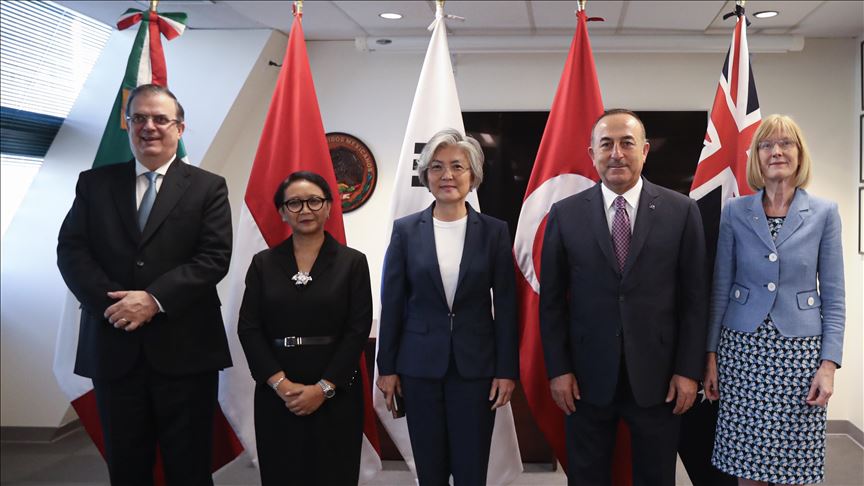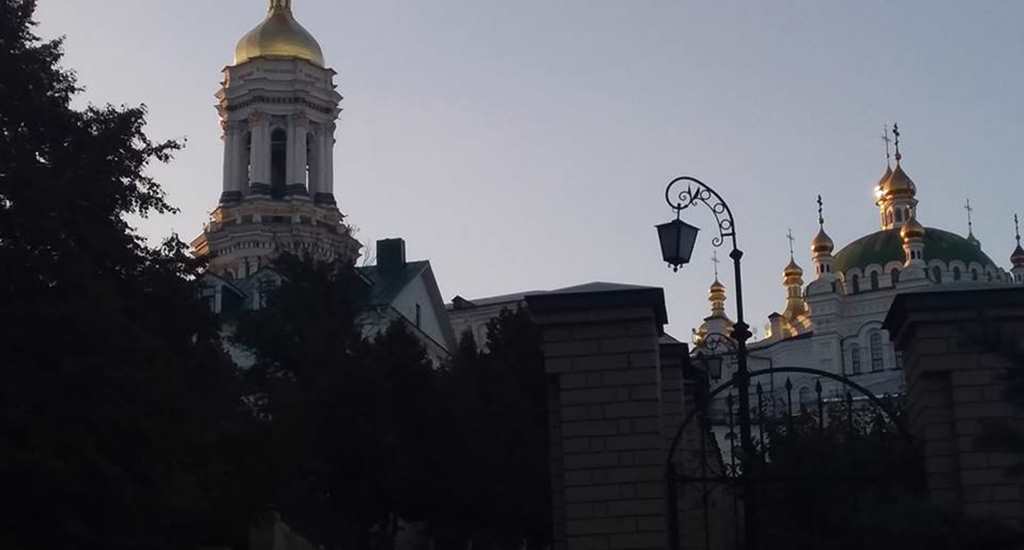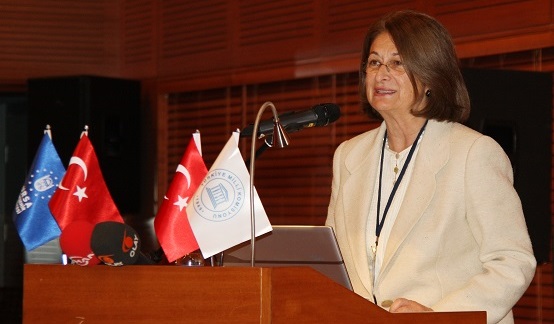
AVİM's Note: In August 2021, AVİM received a letter from Japan that was sent by Iver Torikian, an Armenian whose family once resided in Istanbul. Torikian stated that he wrote the letter because he wanted to inquire the widespread misinformation in Armenian-Turkish relations.
Originating from a scholar of Armenian background, reflecting sincere views in a free environment with an academic objectivity, AVİM has decided to publish the letter in parts over the course of several days. You can read the fourth part of the letter below.
Iver Torikian (August 2021)
Part Four
Turkish scholars have long argued that there is a bias in the Western media in favor of Armenians regarding the events of that era. I have come to agree. Instead of getting a truthful account of what occurred in Turkey during the 19th and early 20th centuries, most people in English-speaking countries get one-sided articles like "A Century of Silence" and misleading books like The Burning Tigris. Along those same lines, Khatchadourian and Balakian get remunerated and praised. In the edition of The Burning Tigris that I have on my shelf, in the initial pages, there are three pages of quotes excerpted from reviews of the book. One reviewer called it "a thoughtful and thorough book." Another called it "encyclopedic." A third called it "comprehensive." Needless to say, I strongly disagree with all these reviewers.
Thanks to such reviews, however, so-called historical articles by Balakian continue to appear in print and online. The articles are new, but they all have the old bias against Turks and Turkey, and they all obscure Armenians' violent acts of long ago. And Balakian remains a popular source for the English-language media. A few years ago, he even appeared on a well-known program called "Sixty Minutes" in the US. Meanwhile, writers who are fairer and more scholarly, like Ronald Grigor Suny and Professor Gerard Libaridian -- a colleague of Suny's -- get far less attention.
As an Armenian, I suppose I should be happy that hundreds of millions of people around the world have great sympathy for Armenians and are willing to turn a blind eye to all the destruction and killing that we ourselves carried out over a century ago. But I am not happy. I feel as if I am an accomplice to a huge cover-up. Our constant and wide-spread wailing about the misery we endured long ago seems designed to bury all the wrongs that we ourselves committed during that era. To demand reparations and apologies from the Turkish government while we keep silent about all the misdeeds that we ourselves carried out back then is unjust and hypocritical.
Late in 2015, just a few months after I began reading in depth about Armenians and the Ottoman Empire, I realized that my plan to send a letter to a US newspaper to foster reconciliation between Turks and Armenians had been naive. We Armenians have been nursing a grudge that has completely swallowed us. Furthermore, most Armenians, I think, are determined to continue repeating to non-Armenians a simplistic, false narrative about the events of a century ago. I no longer have any hope that large numbers of Armenians are going to acknowledge all the wrongs that we ourselves committed in the late 19th and early 20th centuries in Turkey. Nor are we going to stop making outlandish demands for compensation and territory.
According to Meline Toumani, who wrote There Was and There Was Not, the focus of most social gatherings among Armenians in North America is the Armenian Cause. It is evident even in seemingly apolitical gatherings, such as sporting events. The Armenian Cause allows us to get together and ignore all our differences in age, religion, social status, and sexual orientations. The three most conspicuous activities of Armenians -- reiterating the misery we endured over a century ago, avoiding all discussion of our villainy from that same era, and demanding reparations and territory -- are all inseparable and necessary for the preservation of Armenian unity. Hrant Dink himself once said that we Armenians have formed an identity not as ourselves but in opposition to Turks. He was correct.
However, I myself cannot conform to the way that most other Armenians think, talk, and behave. I find it stifling and dishonest. I am reminded of what one contributor wrote at the site of the Islamic Party of Britain which I came upon in 2015. The contributor says that Armenian writers tend to portray everyone in the Ottoman Empire as either "white-hatted heroes" or "black-hatted villains." But as that contributor pointed out, the distinction between good people and bad people of that era was hardly ever clear-cut. I would venture to say that there is not one single ethnic group on Earth that does not have blood on its hands. I believe, sadly, that from the moment in which we humans began living in groups, we began fighting other groups. By insisting that we Armenians did nothing wrong over a century ago, we deny that we are human. I also believe that, if we follow our present course, we may get the world's sympathy, but we will never get the world's respect.
Over a decade ago, about 32,000 Turks signed an online petition to express remorse for what happened to Armenians in Turkey long ago. It became known as the "I Apologize" campaign. To be honest, apologizing for something that one's predecessors have done is troubling to me. I can apologize for things I have done, of course, and I suppose that apologizing for the misbehavior of one's children is also appropriate. I am not sure, however, if apologies for what one's ancestors have done carries much weight or validity. Nonetheless, I respect each of those 32,000 people who signed that petition. They had the courage and integrity to look at what Turks had done to Armenians over a century ago, and they did what they thought was right.
Conversely, I have never heard of any Armenians at all expressing any remorse for what we did over a century ago. My mother once told me about a conversation she had many decades ago with an elderly Armenian man about the turmoil in Turkey in the early 20th century. "There was a lot of killing on both sides," he told her. It is what I have been reading for six years. And yet, nowhere -- not in any document on any website, nor in any book -- have I come upon any signs of contrition by an Armenian about what we did during that era. I am ashamed of Armenians' silence.
It is hard to know where to begin calculating the misery and hardships that we Armenians -- Armenian men, mostly -- have caused other people over the centuries. Aside from historians, most people do not know that two millennia ago we had an Armenian king who created a vast Armenian empire. His name was Tigranes. This is what my Encyclopedia Americana says about him: "He invaded Cappadocia in 78 and completely subjugated its inhabitants. Other wars followed and Tigranes became the mightiest king in Asia. He built a new capital, Triganocerta, whither he transplanted the inhabitants of many captive places, including Cappadocia, Syria, and Cilicia." I am particularly intrigued by the last sentence in that entry. According to my encyclopedia, Tigranes chose to create a new city, and, in order to populate it, he forcibly moved people to that city from other places. In other words, nearly twenty centuries ago, we did to people in Cappadocia, Syria, and Cilicia what the Ottoman government did to Armenians in the early 20th century, more or less. How much misery and death we caused those whom we forcibly relocated two millennia ago will never be known.
Of course, my Encyclopedia Britannica also has an entry on Tigranes. It is different from my Encyclopedia Americana in one way: it says that Tigranes's displacements of people is "much disputed." Otherwise, the information in my two encyclopedias regarding Tigranes is much the same. My Encyclopedia Britannica says that, in addition to invading Cappadocia, Tigranes also invaded Syria and "destroyed the Greek town of Soli." It adds that Tigranes "also transplanted many Arabic tribes into Mesopotamia." In short, our empire seems to have been as ruthless as any other.
The Armenian Empire, such as it was, did not last long. After Tigranes's death, our empire basically fell apart. Most of the territories that Tigranes had controlled were invaded and subsumed into the territories of neighboring kingdoms. At the start of the 15th century, the last remaining Armenian kingdom was decisively partitioned between Persia and the Ottoman Empire.
It is probably impossible to say for sure when we Armenians first began plotting to re-establish an Armenian kingdom or state. It may have been during the 15th century, soon after our last kingdom disappeared. In 2018, I found a long article online titled "The Armenian Rebellion of the 1720s" by an Armenian named Armen M. Aivazian, a student at the American University of Armenia, which is located in Yerevan. He writes in his essay about Armenians who were living in Karabakh. That is, of course, the same Karabakh that Armenia fought over with Azerbaijan three decades ago and also a year ago. Aivazian says in his essay that, centuries ago, Armenians in Karabakh had "a sophisticated system of weapons manufacture, which originated much earlier than the 1720s and even before 1632." 1632 was the year in which 40,000 armed Karabakh Armenians "were ready to launch a liberation war," according to Aivazian. So, it seems that as early as the 1630s, there were already tens of thousands of Armenians who were willing to fight to re-establish an Armenian homeland, and we were armed.
The rebellion that Aivazian alludes to in the title of his essay began in 1722 with a "Georgian-Armenian army of about 50,000." They were prepared to fight alongside Russian soldiers, because Peter the Great had promised to help them gain liberation from the Ottomans. However, the Russian soldiers failed to show up. Instead, they attacked Persia. It did not go well for them. They suffered heavy losses, and these losses, as Aivazian puts it, "compelled Peter the Great to renege on his promises to the Transcaucasian Christians." It was one of the many cases of Russian involvement with the Ottoman Armenians over the next two centuries. (4/5)
© 2009-2025 Avrasya İncelemeleri Merkezi (AVİM) Tüm Hakları Saklıdır
Henüz Yorum Yapılmamış.
-
 STRATEJİK SUSKUNLUK: ERMENİLERİN SESSİZLİĞİ (DÖRDÜNCÜ BÖLÜM) - 08.2021
STRATEJİK SUSKUNLUK: ERMENİLERİN SESSİZLİĞİ (DÖRDÜNCÜ BÖLÜM) - 08.2021
Iver TORIKIAN 30.11.2021 -
 STRATEJİK SUSKUNLUK: ERMENİLERİN SESSİZLİĞİ (BİRİNCİ BÖLÜM) - 08.2021
STRATEJİK SUSKUNLUK: ERMENİLERİN SESSİZLİĞİ (BİRİNCİ BÖLÜM) - 08.2021
Iver TORIKIAN 15.11.2021 -
 STRATEGICALLY MUM: THE SILENCE OF ARMENIANS (PART FIVE) - 08.2021
STRATEGICALLY MUM: THE SILENCE OF ARMENIANS (PART FIVE) - 08.2021
Iver TORIKIAN 03.12.2021 -
 STRATEGICALLY MUM: THE SILENCE OF ARMENIANS (PART FOUR) - 08.2021
STRATEGICALLY MUM: THE SILENCE OF ARMENIANS (PART FOUR) - 08.2021
Iver TORIKIAN 30.11.2021 -
 STRATEJİK SUSKUNLUK: ERMENİLERİN SESSİZLİĞİ (BEŞİNCİ BÖLÜM) - 08.2021
STRATEJİK SUSKUNLUK: ERMENİLERİN SESSİZLİĞİ (BEŞİNCİ BÖLÜM) - 08.2021
Iver TORIKIAN 03.12.2021
-
 ÇOK TARAFLILIĞIN YENİDEN ELE ALINMASI: TÜRKİYE’NİN MIKTA DÖNEM BAŞKANLIĞI - 05.04.2022
ÇOK TARAFLILIĞIN YENİDEN ELE ALINMASI: TÜRKİYE’NİN MIKTA DÖNEM BAŞKANLIĞI - 05.04.2022
Deniz ÜNVER 10.06.2022 -
ROMANYA EKONOMİSİNDE KEMER SIKMA POLİTİKALARINA DEVAM Dr. Erhan TÜRBEDAR
- 06.12.2011 -
 VE ORTODOKS DÜNYASINDA İPLER KOPTU - SÖYLEDİK.COM.TR - 12.10.2018
VE ORTODOKS DÜNYASINDA İPLER KOPTU - SÖYLEDİK.COM.TR - 12.10.2018
Deniz BERKTAY 12.10.2018 -
 BULGARIA: AN UNLIKELY PERSONALITY CULT - NEW EASTERN EUROPE - 07.09.2018
BULGARIA: AN UNLIKELY PERSONALITY CULT - NEW EASTERN EUROPE - 07.09.2018
Tomasz Kamusella 10.09.2018 -
 ERMENİSTAN CUMHURBAŞKANI’NA AÇIK MEKTUP - 27.05.2019
ERMENİSTAN CUMHURBAŞKANI’NA AÇIK MEKTUP - 27.05.2019
Melek Sina BAYDUR 28.05.2019


